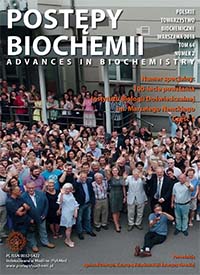BRCA1 deficiency and synthetic lethality in leukemias; not only gene mutation matters
DOI:
https://doi.org/10.18388/pb.2018_124Abstract
BRCA1 (breast cancer 1 susceptibility protein) is one of main regulators of cellular genomic stability. It is responsible for proper segregation of chromatides to daughter cells during mitosis as well as DNA double strand breaks repair by homologous recombination (HR). Genetic alterations of BRCA1 gene are cancer predisposition markers. Mutations or epigenetic alterations have been noticed in breast, ovarian and prostate cancers, significantly increasing risk of cancer development. Such gene alterations are not connected with leukemias. Importantly, BRCA1 deficiency is a factor which makes patients susceptible for personalized therapy with PARP1 inhibitors, which is based on the phenomenon called synthetic lethality. In this review we present our discoveries of novel mechanism leading to BRCA1 deficiency in leukemia, which is not connected with BRCA1 gene mutations or epigenetic alterations, but with attenuated translation of BRCA1 protein linked to the cellular stress response and controlled by RNA binding proteins. Moreover, we found that some treatments or genetic alterations in leukemias might also result in BRCA1 deficits. Our studies provide evidence that PARP1 inhibitors should be considered as efficient treatment in BRCA1-deficient leukemias, leading to elimination of cancer cells, including
stem and progenitor cells. Finally we propose a strategy to select leukemia patients which might be sensitive to therapy with PARP1 inhibitors.
Downloads
Published
Issue
Section
License
All journal contents are distributed under the Creative Commons Attribution-ShareAlike 4.0 International (CC BY-SA 4.0) license. Everybody may use the content following terms: Attribution — You must give appropriate credit, provide a link to the license, and indicate if changes were made, ShareAlike — If you remix, transform, or build upon the material, you must distribute your contributions under the same license as the original. There are no additional restrictions — You may not apply legal terms or technological measures that legally restrict others from doing anything the license permits.
Copyright for all published papers © stays with the authors.
Copyright for the journal: © Polish Biochemical Society.




